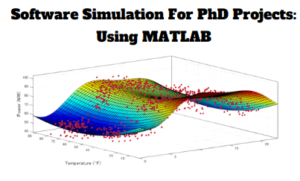Software Simulation for PhD Projects: Using MATLAB
Software simulation is the process of creating a realistic model of a system or engineering application, calculating and predicting its behaviour. It is used to test systems for reliability or performance, to identify specific problems and to predict behaviours. Software simulation is an effective tool for PhD candidates, allowing them to test and validate their theories before investing time in building physical prototypes.
It can be used to test the model and validate hypotheses, as well as to assess the performance of new designs.
It is also a good way to understand how the system operates by simulating its behaviour. Simulations are especially useful when it comes to complex systems.
Many research papers that deal with simulation use software implementation tools that provide the necessary functionality for creating models, validating hypotheses and assessing performance for testing purposes. These tools are available for free on the web, so anyone can access them. MATLAB is one such resource tool that has been widely used in simulation research projects.

How MATLAB helps
MATLAB is one of the best tools used for research purposes due to high graphical functionalities and advanced features which makes it one of the most useful tools for programming, and it is one of the most widely used data analysis, simulation and visualisation tools in the world. With MATLAB, you can do all of these things, and more. It’s a powerful tool for research, and it’s very flexible. It is used for applications in engineering topics such as dynamics, vibrations, systems, control, fluid mechanics, and heat transfer.
Researchers use MATLAB for a variety of purposes, from creating complex simulations to analysing data. Some of the most common applications of MATLAB include data analysis, data visualisation, and simulation. Researchers use MATLAB to analyse data and create models that simulate their real-world counterparts. Researchers can also use MATLAB to design and test existing theories or processes. Many researchers use MATLAB to create simulations that help them understand how their research or processes function, or how they might fail in the future.
With MATLAB, researchers can have an environment to perform numerical analysis to deduct what applies to a theory or design they are developing. The primary purpose of MATLAB in research is to demonstrate that results are viable to be applied to real world problems and the MATLAB environment provides the necessary tools to verify and check this hypothesis. It is also used for complex mathematical computations.
The research project obviously begins with the formulation of a problem that is to be solved with an innovative solution you propose in your project. This is then justified using new algorithms, methodologies and techniques. The project is then run in the MATLAB environment to evaluate its performance and the new concept is then clearly defined with future applications or limitations.
How PhD Guidance can support researchers
PhD guidance provides for expert aid in simulation and implementation of your MATLAB needs from the field of Civil, Mechanical, Electrical, Electronics and Computer Science including computation, visualisation and programming to perform mathematical calculations and use any advanced features of the software for modelling your research project ranging from mathematics (numerical computing), development of algorithms, image processing, modelling and simulation of systems.
The experts will guide you through the vast scope of MATLAB applications and help you in choosing the right tools to work on quantitative data analysis or other aspects of your research project that can be implemented using MATLAB. The statisticians will help you develop the necessary algorithm to simplify your analysis process and can help you explore new avenues of real-world applications of your research with our completely customised approach.

